Podcast: Play in new window | Download (Duration: 32:38 — 22.4MB) | Embed
Subscribe: Apple Podcasts | Spotify | Amazon Music | Android | Pandora | iHeartRadio | JioSaavn | Podchaser | Gaana | Podcast Index | Email | TuneIn | Deezer | Anghami | RSS | More

Letter 169 – The Letters of St. Elizabeth of the Trinity – Beginning to Pray with Dr. Anthony Lilles
Dr. Anthony Lilles and Kris McGregor delve into the life and spirituality of St. Elizabeth of the Trinity. Dr. Lilles brings up her significance as a prophet for our times, offering a grounding in the Holy Trinity amid the frenzy of modern life. He explains how Elizabeth’s deep faith and prayer life provide a sense of heaven on earth, which resonates with many people today.
They explore Elizabeth’s relationships, especially her correspondence with Father Les, an old family friend and priest. Recounting how Elizabeth confided her vocation to Father Les as a child and how he supported her throughout her religious journey, we see Elizabeth’s profound spiritual insights, even during her “dark night,” illustrate her unwavering faith and eventual spiritual renewal.
Elizabeth’s letters, particularly one written in July 1903, reveal her spiritual depth and commitment. She writes about her intense desire to love God, seeing her profession as a dawn and her life as a bride of Christ as enveloped in peace and love. Her prayer life and silent communion with God allowed her to feel deeply connected to others, even when physically separated.
The broader implications of Elizabeth’s spirituality, emphasizing the importance of silent prayer and the mystical union with Christ. This union transcends physical separation, offering a profound sense of communion with others through Christ. This deep prayer life is not just a private endeavor but integral to the mystical body of Christ, fostering connections that surpass physical proximity.
Discerning Hearts Reflection Questions

Letter 169
L 169
To Canon Angles
[ July 15, 1903]
Dijon Carmel,J. M. + J. T.
Monsieur le Chanoine,
My dear Mama, whom I saw last week, brought me your good letter, and I assure you that I can indeed sympathize with the suffering your eyes are causing you, and I am praying fervently for you. I was wondering a little what had become of you, but you find your little Carmelite close to God, don’t you? And that is where she finds you too; then no more distance, no more separation, but already, as in Heaven, the fusion of hearts and souls! . . . How many things have happened since my last letter! I heard the Church say “Veni sponsa Christi” [Come, bride of Christ]; she consecrated me, and now all is “consummated.” Rather, everything is beginning, for profession is only a dawn; and each day my “life as a bride”3 seems to me more beautiful, more luminous, more enveloped in peace and love. During the night that preceded the great day, while I was in choir awaiting the Bridegroom, I understood that my Heaven was beginning on earth; Heaven in faith, with suffering and immolation for Him whom I love! . . . I so wish to love Him, to love Him as my seraphic Mother did, even to dying of it. We sing “O charitatis Victima” on her feast day, and that is my whole ambition: to be the prey of love! I think that in Carmel it is so simple to live by love; from morning to evening the Rule is there to express the will of God, moment by moment. If you knew how I love this Rule, which is the way He wants me to become holy. I do not know if I will have the happiness of giving my Bridegroom the witness of my blood [by martyrdom], but at least, if I fully live my Carmelite life, I have the consolation of wearing myself out for Him, for Him alone. Then what difference does the work He wills for me make? Since He is always with me, prayer, the heart-to-heart, must never end! I feel Him so alive in my soul. I have only to recollect myself to find Him within me, and that is my whole happiness. He has placed in my heart a thirst for the infinite and such a great need for love that He alone can satisfy it. I go to Him like a little child to its mother so He may fill, invade, everything, and then take me and carry me away in His arms. I think we must be so simple with God!
I am longing to send you my good Mama; you will see how God is working in this beloved soul. Sometimes I cry for happiness and gratitude; it is so good to be devoted to your mother, to feel that she, too, is completely His, to be able to tell her about your soul and to be completely understood! . . . You really are the great attraction of the trip, I assure you; I love to remember those vacations at Saint-Hilaire, then at Carcassonne and Labastide, they were the best ones I had. With what fatherly goodness you received the confidences I so loved to make to you; I would be happy if one day they could be made once again through my dear grilles. Won’t you come to bless your little Carmelite and, quite close to her, thank Him who “has loved her exceedingly,” for, you see, my happiness can no longer be expressed. Listen to what is being sung in my soul and all that is rising from the heart of the bride to the Heart of the Bridegroom for you whose little child she will always be. Send her your best blessing; at Holy Mass, bathe her in the Blood of the Bridegroom; it is the purity of the bride, and she is so thirsting for it! A Dieu, monsieur le Chanoine, affectionately and respectfully yours,
Sr. Elizabeth of the Trinity r.c.i.
Catez, Elizabeth of the Trinity. The Complete Works of Elizabeth of the Trinity volume 2: Letters from Carmel (pp. 110-111). ICS Publications. Kindle Edition.
We would like to thank Miriam Gutierrez for providing “the voice” of St. Elizabeth for this series
For other episodes in the series visit the Discerning Hearts page for Dr. Anthony Lilles
Anthony Lilles, S.T.D., has served the Church and assisted in the formation of clergy and seminarians since 1994. Before coming to St. Patrick’s, he served at seminaries and houses of formation in the Archdiocese of Denver and the Archdiocese of Los Angeles. The son of a California farmer, married with young adult children, holds a B.A. in theology from the Franciscan University of Steubenville with both the ecclesiastical licentiate and doctorate in spiritual theology from the Pontifical University of Saint Thomas Aquinas in Rome (the Angelicum). An expert in the writings of St. Elizabeth of the Trinity and the Carmelite Doctors of the Church, he co-founded the Avila Institute for Spiritual Formation and the High Calling Program for priestly vocations. He also founded the John Paul II Center for Contemplative Culture, which hosts symposiums, retreats, and conferences. In addition to his publications, he blogs at www.beginningtopray.com .

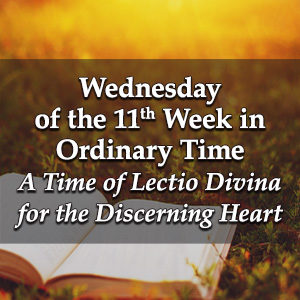 Wednesday of the Eleventh Week of Ordinary Time – A Time of Lectio Divina for the Discerning Heart Podcast
Wednesday of the Eleventh Week of Ordinary Time – A Time of Lectio Divina for the Discerning Heart Podcast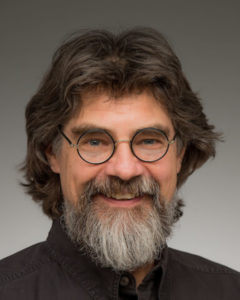




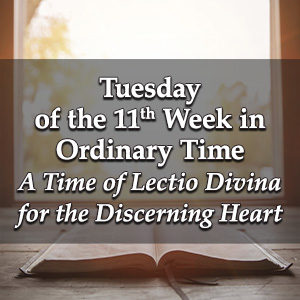 Tuesday of the Eleventh Week of Ordinary Time – A Time of Lectio Divina for the Discerning Heart Podcast
Tuesday of the Eleventh Week of Ordinary Time – A Time of Lectio Divina for the Discerning Heart Podcast

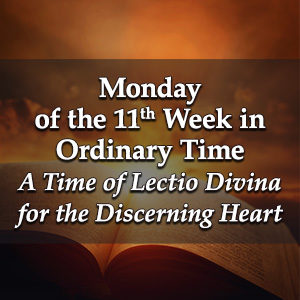 Monday of the Eleventh Week of Ordinary Time – A Time of Lectio Divina for the Discerning Heart Podcast
Monday of the Eleventh Week of Ordinary Time – A Time of Lectio Divina for the Discerning Heart Podcast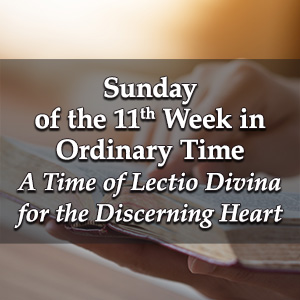 Sunday of the Eleventh Week of Ordinary Time – A Time of Lectio Divina for the Discerning Heart Podcast
Sunday of the Eleventh Week of Ordinary Time – A Time of Lectio Divina for the Discerning Heart Podcast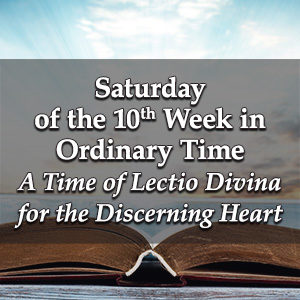 Saturday of the Tenth Week of Ordinary Time – A Time of Lectio Divina for the Discerning Heart Podcast
Saturday of the Tenth Week of Ordinary Time – A Time of Lectio Divina for the Discerning Heart Podcast
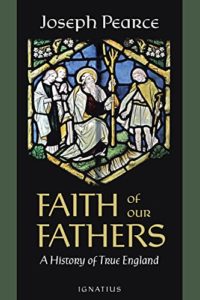
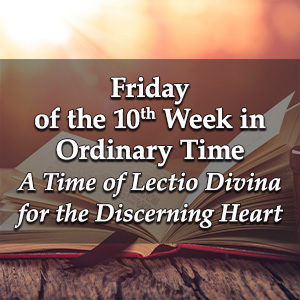 Friday of the Tenth Week of Ordinary Time – A Time of Lectio Divina for the Discerning Heart Podcast
Friday of the Tenth Week of Ordinary Time – A Time of Lectio Divina for the Discerning Heart Podcast